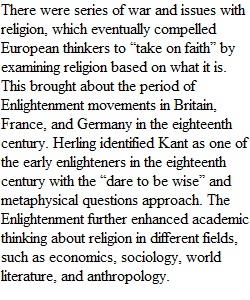


Q This assignment was locked Jun 18, 2017 at 11:59pm. 1. What are the key historical factors that allowed the academic study of religion to emerge in the European university setting? 2. What are some of the key terms in Otto's theory of religion, and what do they mean? What is his overall theory of religion? 3. Pick your own example of a religious belief, person, and practice, and analyze it using Otto's theoretical ideas. 4. What are some of the key terms in Weber's theory of religion, and what do they mean? What examples does he use to support his theories? Make sure not to just list, but discuss. 5. What are some of the key terms in James' theory of religion, and what do they mean? What examples does he use to support his theories? Make sure not to just list, but discuss. 6. What are some of the key terms in Turner's theory of religion, and what do they mean? What examples does he use to support his theories? Make sure not to just list, but discuss. 7. What are some of the ket terms in Geertz's theory of religion, and what do they mean? What examples does he use to support his theories. Make sure not to just list, but discuss. 8. According to Durkheim, what are the main shifts in social systems, moral behavior, politics, and personal affairs that the modern era ushers in? How, according to Durkheim, is social solidarity or unity achieved in modern societies? 9. What is the difference, according to Durkheim, between the sacred and the profane, and what are the features of each? What role does religion play in this distinction, and how does religion foster and reinforce social cohesion? 10. Define and discuss totemism. What is it, and in what sense is it at the origin of religion for Durkheim? How can a focus on totemism explain later religious developments? What social role does the totem play? PreviousNext
View Related Questions